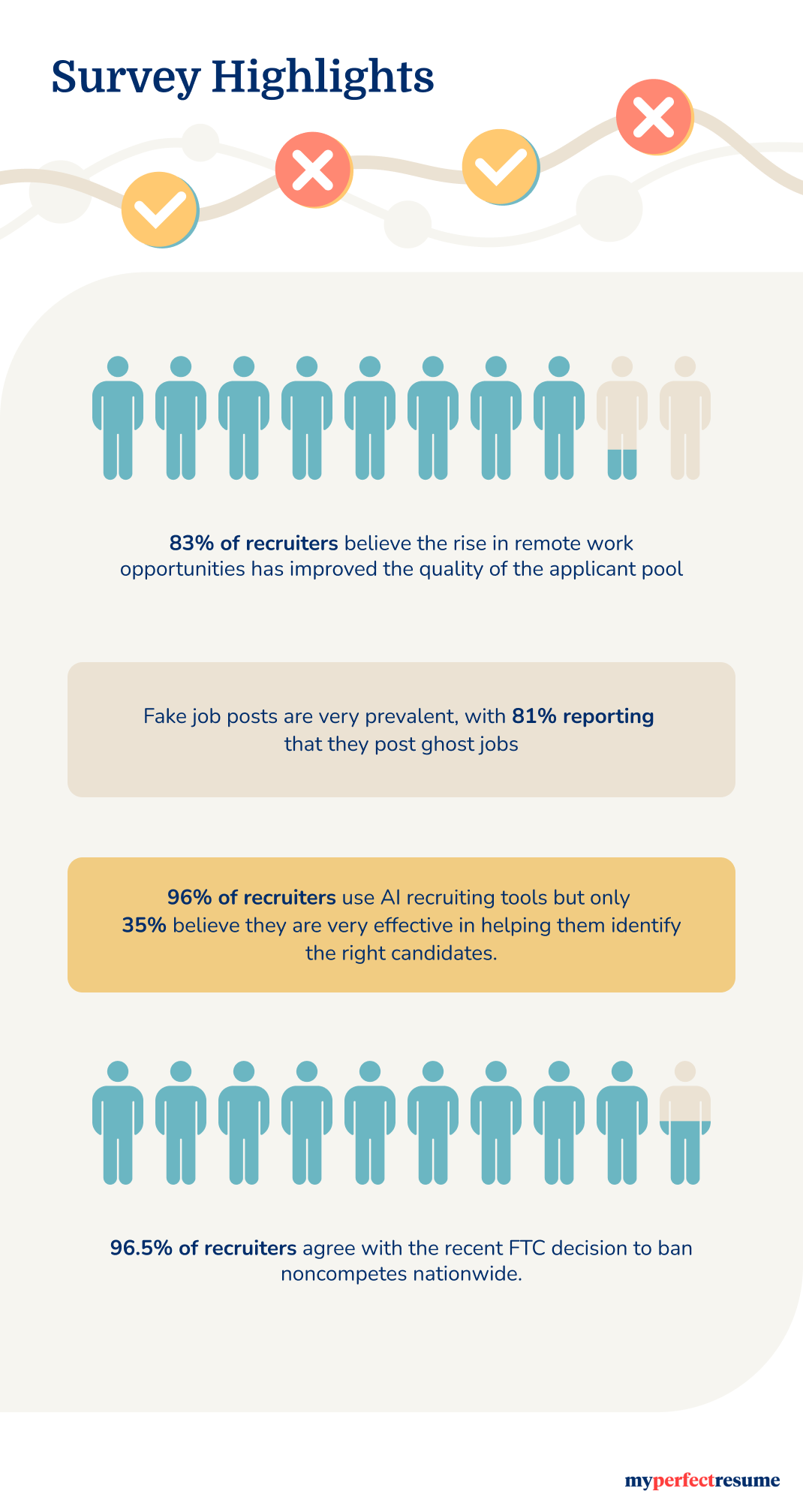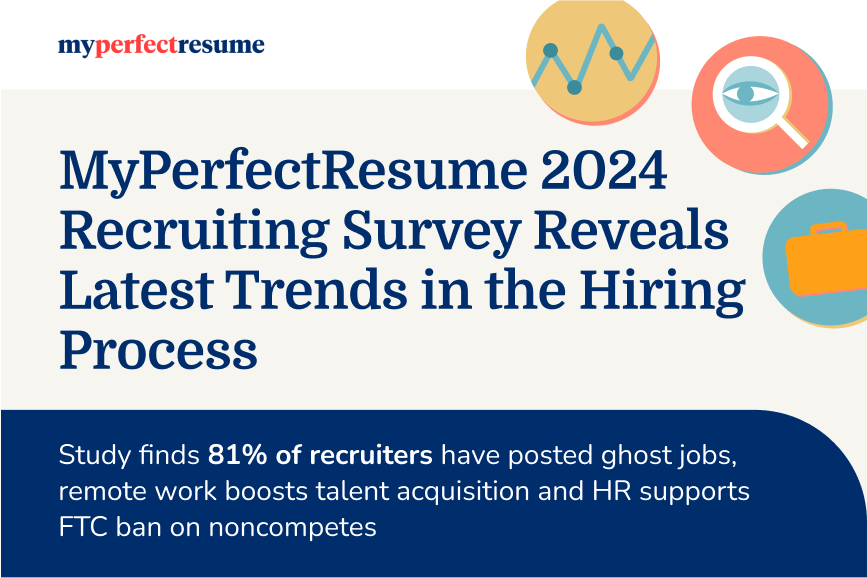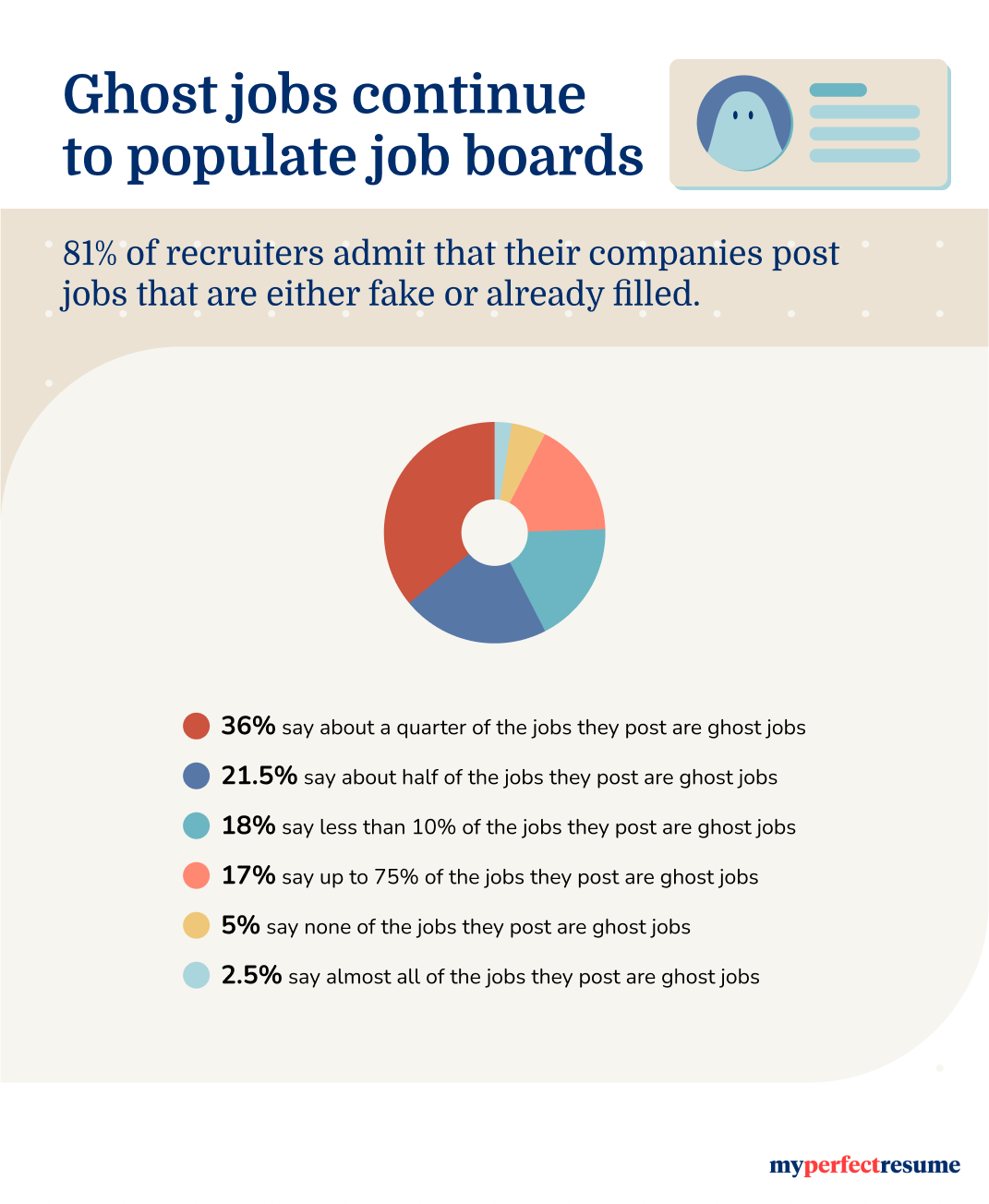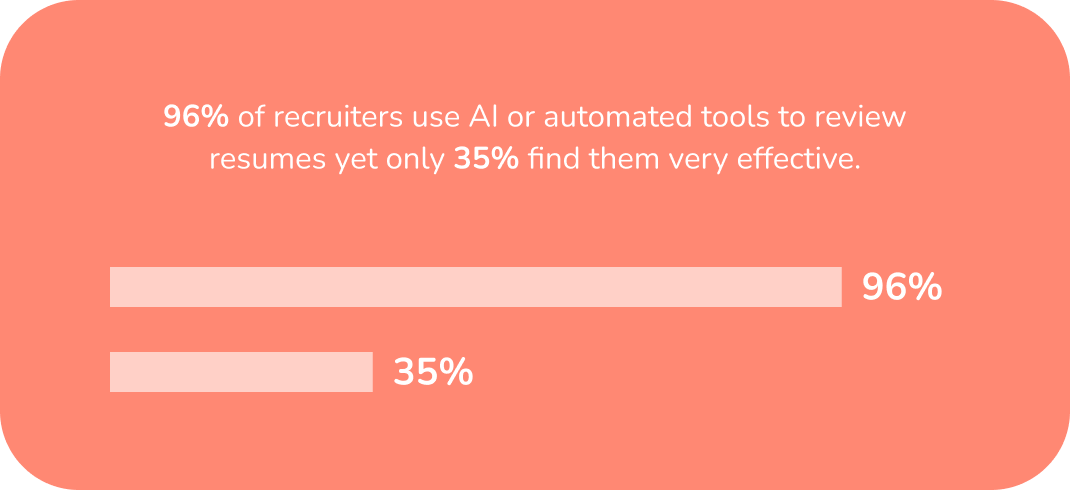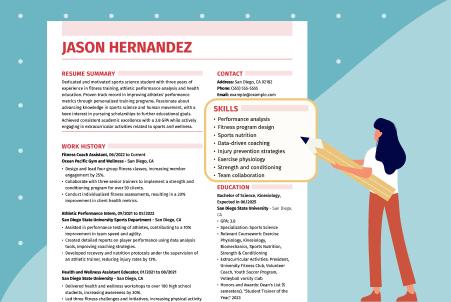Our customers have been hired at: *Foot Note
Table of Contents
Get started with MyPerfectResume today!
- Build a resume on any device
- Pick an ATS-friendly template
- Tailor with AI copy suggestions
Just like the job market shifts and adjusts, so do recruiters' methods to hire top talent.
MyPerfectResume polled 753 recruiters across the U.S. to better understand the latest developments in the recruiting landscape.
The recruiting survey focused on industry trends and issues, including the impact of remote work on talent acquisition, the extensive use of ghost jobs, the efficacy of AI recruiting tools, and recruiters’ feelings about the recent Federal Trade Commission (FTC) decision to ban noncompetes nationwide.
Let’s take a look at the key hiring and recruitment trends the survey identified.
Remote Work Gives Applicant Quality a Boost
The pandemic presented the job market with many challenges, including an extremely tight labor market that made it difficult for recruiters to fill open roles.
Even now, with a more relaxed market, talent acquisition is a top concern for recruiters who continue to struggle to find enough qualified candidates to fill their open positions.
However, the survey found that recruiters filling remote job roles have a leg up on competition and have an easier time attracting talent.
When asked whether the quality of applicants has changed since remote work became more prevalent, most recruiters (83%) surveyed say they believe remote work has improved the quality of the applicants they attract.
When asked how the availability of remote work affected their willingness to consider candidates from different geographic locations, 92% of recruiters say that it has increased their willingness.
Let’s dissect that number:
- 32% say it significantly increased their willingness
- 60% say it somewhat increased their willingness
- 7% say there was no change in their willingness
- 1% say it decreased their willingness
Despite an enthusiasm for remote work and work-from-anywhere jobs, most recruiters prefer to hire locally, with 96% having at least some preference for local candidates.
Here’s how those numbers break down:
- 49% have a strong preference for local candidates
- 47% have some preference for local candidates
- 4% have no preference
Despite a strong preference for local hires, recruiters were extremely open to the idea of hiring candidates who would need to relocate for a role. See recent RTO trends for additional insight.
A high number reported that their companies provide financial support for new hires to relocate.
Let’s look at the responses when recruiters were asked, “Would you consider candidates who need to relocate to work at your company?”
- 73% of respondents say they would consider relocation, and their employer provides relocation support
- 26% say they would consider hiring a non-local candidate, but their employer does not provide relocation support
- Less than 2% of recruiters say they would not consider a candidate that would need to relocate
Job Seekers Face a Scary Number of Ghost Jobs
The survey found that ghost jobs—or job postings for positions that are non-existent or have already been filled—are ubiquitous right now.
Companies' reasons for using this recruiting strategy are varied and complex.
The vast majority of recruiters surveyed (81%) admit that their employer posts ads for jobs that either don’t exist or are already filled. And it isn’t an occasional occurrence.
When asked what percentage of their company's job posts aren’t real, the numbers were surprising. Here’s the breakdown:
When asked why their companies post ghost jobs, recruiters gave many reasons.
The top reason stated was to test the market’s response to hard-to-fill jobs (38%), but there were other common motivations.
Here are the other explanations for posting job ads that are not active:
- 38% to maintain a presence on job boards even when we aren’t hiring
- 36% to assess the effectiveness of their job descriptions
- 26% to build a talent pool for the future
- 26% to gain insights into the job market and our competitors
- 25% to assess how difficult it would be to replace certain employees
- 23% to make the company look viable during a hiring freeze
- 20% to improve the reputation of the company
- 14% to improve the company’s online visibility
- 12% to collect resumes en masse
AI Screening Tools: Enthusiastic Usage, Unsatisfying Results
The survey found that AI screening tools are being used by the vast majority of recruiters, with 96% of recruiters using them. See our recent survey on HR opinions of AI use in hiring for additional information.
Less than 1% of those surveyed reported never using AI or automated screening tools to review resumes.
When asked how often they used the tools to screen resumes:
- 26% say they always use AI or automated tools to screen resumes
- 36% say they frequently use AI or automated tools to screen resumes
- 34% say they sometimes use AI or automated tools to screen resumes
- 4% say they rarely use AI or automated tools to screen resumes
- 1% say they never use AI or automated tools to screen resumes
Despite the widespread use of AI tools, recruiters don’t find them very effective. Only 40% of recruiters surveyed reported finding the tools somewhat or very effective. See our recent study on HR opinions of AI for additional information.
- 35% say they find AI or automated tools very effective
- 5% say they find AI or automated tools somewhat effective
- 26% say they were neutral on the effectiveness of the tools
- 34% say they find AI or automated tools somewhat ineffective
- 1% say they find AI or automated tools very ineffective
Recruiters See FTC Ban on Noncompetes as Good for Businesses and Workers Alike
In April, the Federal Trade Commission issued a decision to ban noncompete clauses nationwide with the hope that this move will raise worker wages, generate over 8,500 new businesses annually, boost innovation in the form of tens of thousands of new patents each year and lower health care costs.
When asked whether they agreed or disagreed with this ruling, 97% of recruiters say they agree with the decision.
When asked if they think the FTC ban on noncompetes will impact employees, the majority believe the decision will benefit workers.
- 58% say it will benefit employees
- 36% say it will harm employees
- 6% say it will have no impact
When asked whether they believe the FTC ban on noncompetes will impact businesses, the majority believe the decision will benefit businesses.
- 59% say it will benefit businesses
- 36% say it will harm businesses
- 4% say it will have no impact
Key Takeaways
The survey results uncovered some compelling issues and trends in today’s recruiting landscape. Most notably:
- 83% of recruiters believe the rise in remote work opportunities has improved the quality of the applicant pool.
- Ghost jobs are very prevalent, with 36% of recruiters saying about a quarter of their job posts are ghost jobs, 22% saying that about half of all the ads they post are fake, and 17% reporting up to 75% of the job postings they list are not jobs they intend to fill.
- 96% of recruiters use AI recruiting tools but only 35% believe they are very effective in helping them identify the right candidates.
- 97% of recruiters agree with the recent FTC decision to ban noncompetes nationwide.
About Us
At MyPerfectResume, we stay ahead of the curve with the latest workplace trends and career advice.
Our extensive collection of resume examples (written by certified professional resume writers) and professional resume templates empower you to adapt to these trends and showcase your skills effectively.
Explore our resources and our user-friendly online Resume Builder to create a standout resume that aligns with the evolving job market, helping you stay competitive and achieve your career goals.
Our customers have been hired at:*Foot Note

